A HARD FOUGHT SHIP
The
story of HMS Venomous
Guests of South African families on"Uphomers"
Brian Shaw and Kenneth Collings, Sick Berth Attendants on HMS Hecla
Until March 2017 Brian Shaw was just a name on the list of 858 men in HMS Hecla
on the night of 11 - 12 November 1942 with MPK (Missing Presumed
Killed) written alongside and a face in a photograph of the medical
team and Sick Bay attendants sent to me by the son of Chief Petty
Officer Norman Brown who was also MPK.
But in March 2017 I received a message sent via a form on my website in
December 2016 from a Louise Duncan in Cape Town,
South Africa. Louise was the daughter of a Cynthia le Roux (nee
Abrahamse) who in 1942
was living with her parents, Pet (Petrus) and Minnie (Wilhelmina)
Abrahamse, on their farm Rondeheuvel at Hermon in Western Cape Province
while her husband, Prins Albert Le Roux, an eigth generation South African of
French Huguenot descent from Blois, Oreleans, was in the SA Signals with the British 8th Army in North Africa.
Cynthia's husband was named after the village of Prins Albert in the Karoo, named after the consort of Queen Victoria.
Cynthia Roux died in 1993 and Louise found in her Mother's papers
several letters from two Sick Berth Attendants who had stayed as
guests on an "uphomer" while Hecla was being repaired after detonating a mine on 15 May 1942. Louise Googled Hecla,
found my website and was hoping I could trace the families of Brian
Shaw and Kenneth Collings and she could return the letters to their
families.
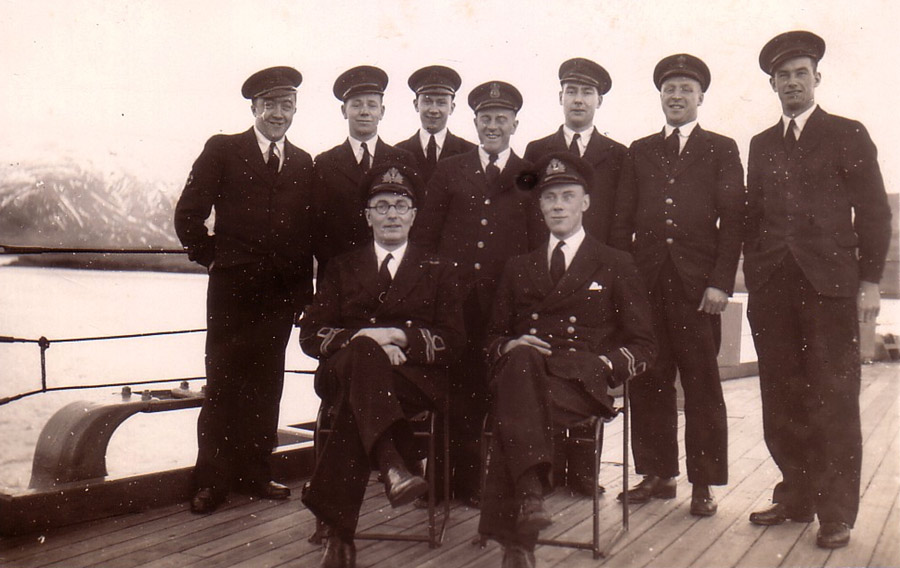 The Medical Team and Sick Berth Attendants (SBA) on the deck of HMS Hecla in 1941 when she was the destroyer Depot Ship at Havelfjord, Iceland
The Medical Team and Sick Berth Attendants (SBA) on the deck of HMS Hecla in 1941 when she was the destroyer Depot Ship at Havelfjord, Iceland
Brian Shaw is standing third from the left but Kenneth Collings only joined Hecla on her return from Iceland in early 1942
Hermon
is a village about an hours drive east of Cape Town where
Louise's grandparents mainly planted vines on their farm but also had
wheat and sheep and cattle. Pet and Minnie Abrahamse, "Oupa and Ouma"
to
Louise, were Africaners, descendants of the Dutch, French and Germans
who came to the Cape,. They were also known as Boers and the language
they speak is Africaans. Louise's grandparents had five Italian POW to
help them farm
at Rondeheuvel
while Cynthia's husband and elder brother were serving in North Africa
with the 8th Army. Brian Shaw and Keith Collings only stayed with them
once in July 1942 but they had many other sailors on "uphomers" at Rondeheuvel. I
was surprised - and impressed - to read an apology in one of Brian's
letters to Cynthia for the mistakes he made in Africaans.
"The
photos were taken at Bainskloof where they used to go for
picnics. It is a beautiful mountain pass at Wellington with a
stream where you could swim or just relax. It is about three quarters
of an hours drive from the farm. Our family loved to go there for
picnics on a Sunday;" Louise Duncan.
Brian Shaw and Kenneth Collings as guests of Cynthia and her parents on their farm in July 1942
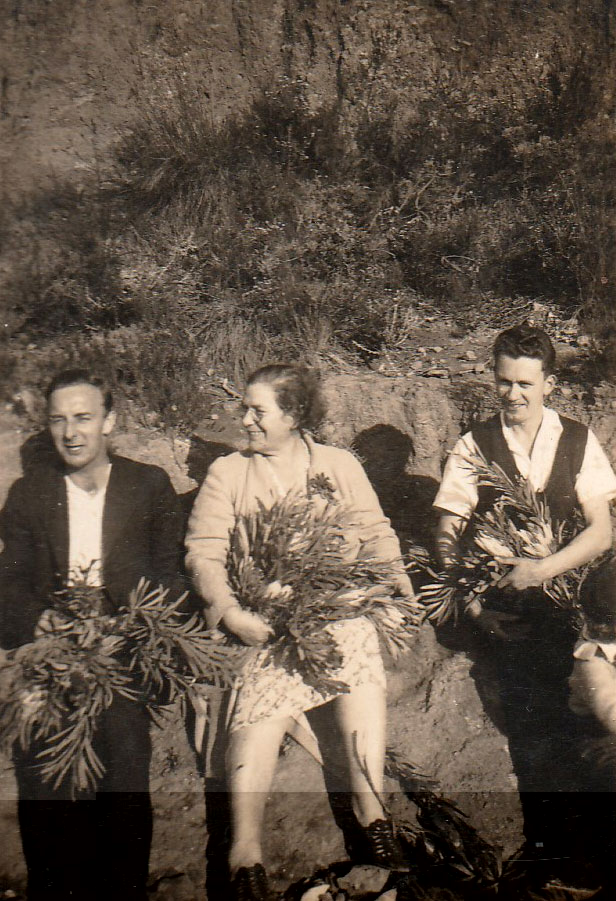
Picking Sugar Bush Proteas in the Veldt
Kenneth Collings (left), Minnie Abrahamse and Brian Shaw
|
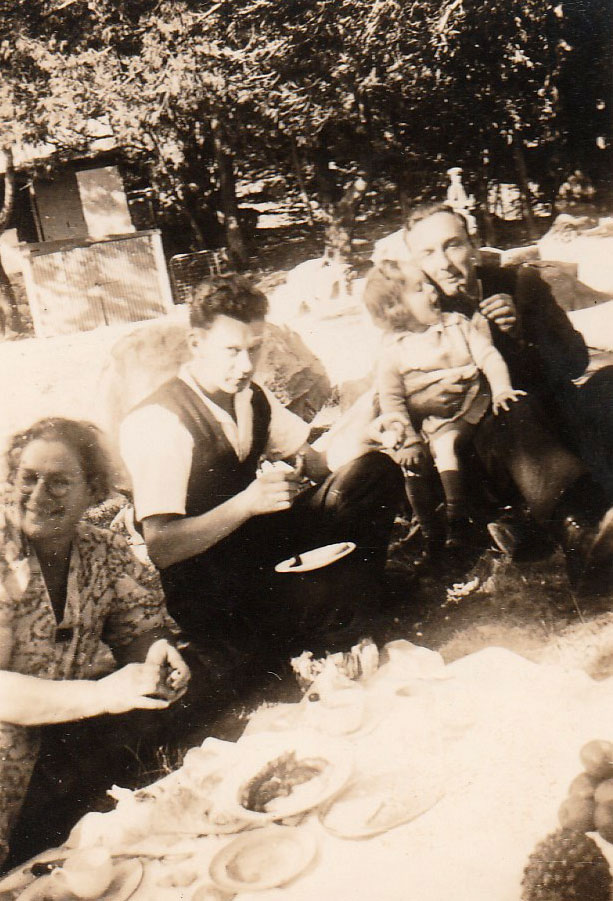
Picknicing at Bainskloof mountain pass in July 1942
Minnie Abrahamse, Brian Shaw, Cynthia's son. Pierre le Roux, and Ken Collings
|
I had never heard of "sugar bush proteas" and Louise Duncan explained:
"Sugarbush - Protea Repens -
is an indigenous plant that grew abundantly on the Cape Flats all the
way from Cape Town to Hermon. It likes a sandy soil without too
much water. The flowers have large quantities of nectar and the
birds and bees love it. Years ago the nectar was collected,
strained and boiled to form a ruby-red syrup. it was used to
sweeten food and also to soothe coughs and chest complaints. It
was used for firewood as well and is hard to find in the wild
nowadays. Still plentiful on mountains and on the farms where
they are grown and the flowers exported."
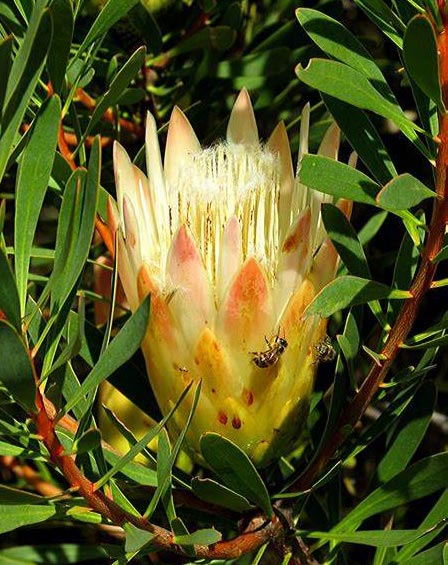
The flower of the Sugar Bush Proteas
The bee gives the scale
|
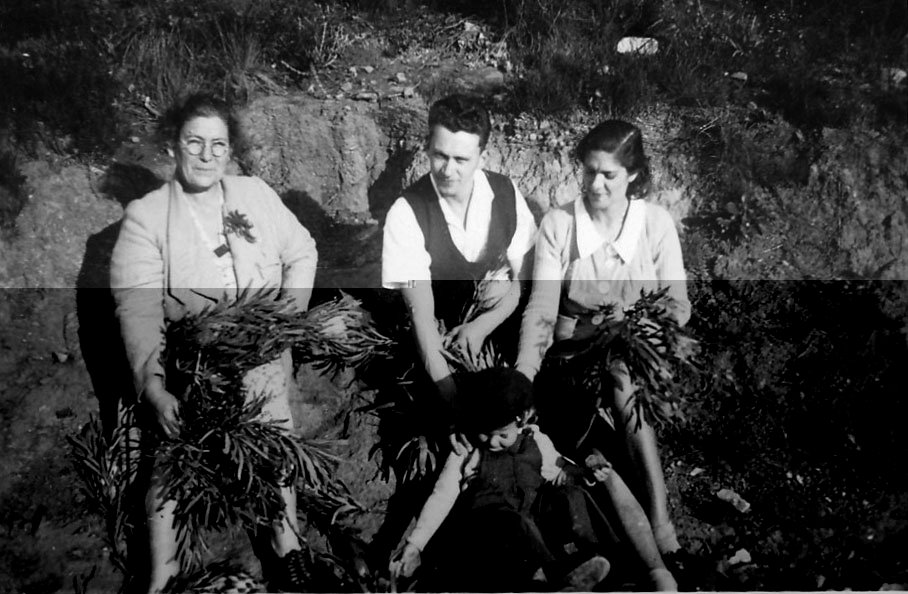
Picking Sugar Bush Proteas at Bainskloof
Minnie Abrahamse, Brian Shaw and Cynthia with Pierre le Roux in front
|
Brian Shaw wrote to Cynthia three times before HMS Hecla
headed north to her fateful encounter with U-515 off the coast of North
Africa. The first page of the last letter dated 29 October is on the
left and the remainder of the letter can be read by clicking on the link. Brian Shaw had less than two weeks to live when he dated this letter. The postcard had his portrait on the front and the Christmas Card may have been received after his death.
|
The
final PS about passing the exams for promotion to Petty
Officer is especially poignant
as he would not live to "pick up the
rating".
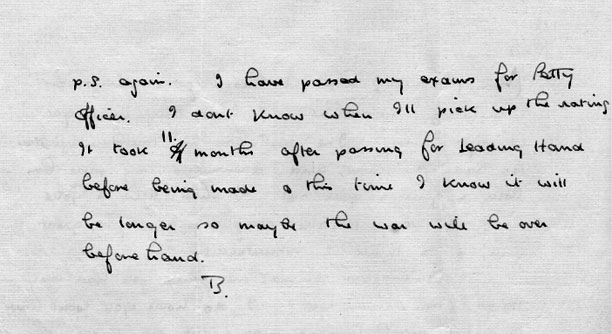
|
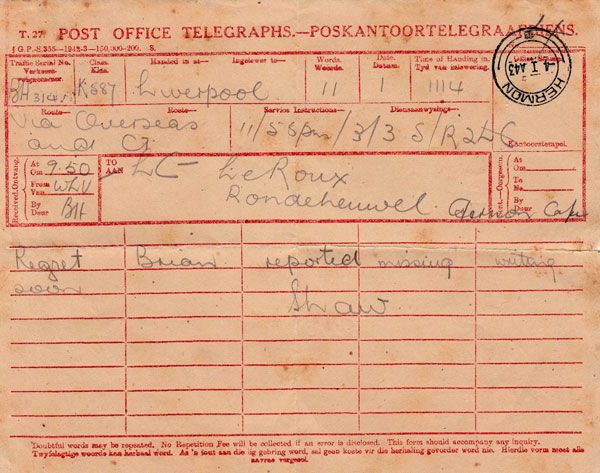
"Regret Brian reported missing writing soon"
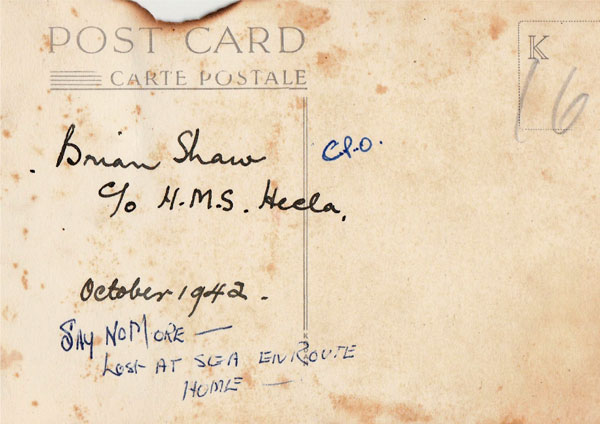 Portrait postcard: " Say no more - lost at sea enroute home"
Portrait postcard: " Say no more - lost at sea enroute home"
|
"De Fumo In Flammam"
Out of the smoke into the fire
- all too apt since Brian Shaw would not live to see Christmas -
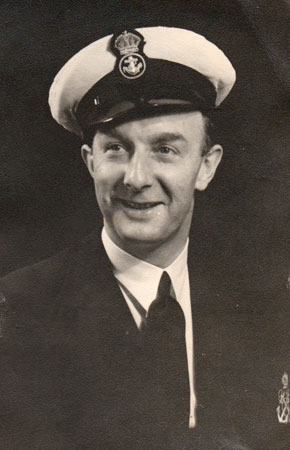
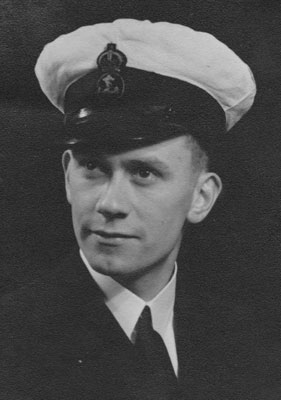 It
wasn't difficult to return the letters sent by Kenneth Collings (left)
as I had been contacted by his son in New Zealand in November 2012 and
his father already had a page on this website. Bruce was delighted to
receive letters written by his father to Cynthia le Roux in 1942 but it
was more difficult to trace the family of Bruce Shaw (right) despite
having his address on the top of his Mother's letters.
It
wasn't difficult to return the letters sent by Kenneth Collings (left)
as I had been contacted by his son in New Zealand in November 2012 and
his father already had a page on this website. Bruce was delighted to
receive letters written by his father to Cynthia le Roux in 1942 but it
was more difficult to trace the family of Bruce Shaw (right) despite
having his address on the top of his Mother's letters.
Cynthia
le Roux kept the letters she received from Florence Shaw, Brian Shaw's Mother, after
his death. At first Florence was too grief
stricken to write but on 12 January her husband wrote
explaining her silence. Florence wrote from the
family home of Oakdale in Frodsham, Cheshire, in March and again on 21 April:
"We can't think of the words to
thank you for all your kind thoughts and messages to us in our dreadful
sorrow, no other word from the Admiralty has come along. Have you heard
from your brother that you feared was a POW in Italy? We do hope you
have got somewhere to write him. These shocks are almost more than we
can bear".
Cynthia's brother Lionel was captured at Tobruk but ended up as a POW
at Stalag 7 in Germany. Click on the link to read Florence Shaw's short painful letter.
Google
helped me trace the only surviving members of Brian Shaw's family in
Britain. Gill Holt, a distant cousin, posted an enquiry about Brian on U-Boat.net in
January 2005 and on RootsChat a Family History Forum in May. I joined
as "Venomous Bill" and we were soon in touch by e-mail. She knew a lot
about Brian Shaw's ancestry but very little about his life. Gill Holt
and her brother William were the grand children of Brian Shaw's Uncle, William
Morris Shaw, and she told me all I know about Brian Shaw and his
family. I sent Gill Holt the letters he
wrote to Cynthia in 1942 but it is only now in August 2021 that I am
finally telling his story on this website where it can be read by the families of his shipmates on HMS Hecla.
Brian
William Coulson Shaw was the son of William Coulson Shaw and his wife
Florence Hoskins Davies and was born at Crosby, Liverpool on 11 July
1913 and went to
Merchant Taylors' School For Boys, Crosby, which celebrated its 400th
anniversary in 2020. Brian and his siblings, two brothers and a
sister,
were all born in Liverpool where his father was in the grocery trade
but moved to Frodsham in Cheshire when his father retired.
At
present we do not know what he did between leaving school at 16 in 1929
and joining the Navy in February 1940 when he gave his occupation as
"clerk". He may have been distantly related via his Mother to Rear Admiral A H Hoskins who
chaired the Hoskins Committee whose report led to the establishment of
a trained Sick Berth Rating Staff in 1884. His Service Certificate is
not on the
National Archives website despite him being born more than a hundred
years ago but could be obtained by a family member.
Bruce Shaw and his three siblings never married and left no children.
Brian's parents died in 1950 and 1951 and Oakdale was cleared and sold
and their oldest son Edmund Morris Shaw and his sister Joan emmigrated
to Sothern Rhodesia (Zimbabwe) soon afterwards. Gill Holt lives near
Frodsham:
"Brian's parents
& grandparents are buried in Frodsham Parish Church. Brian is
remembered on the War Memorial outside the front of the church, on a
Memorial which stands on Frodsham Hill overlooking the River Mersey and
on the large War Memorial on Plymouth Hoe."
Bruce Shaw was accompanied by SBA Petty Officer Kenneth Collings on their "uphomer" at Rondeheuvel and
Louise Duncan also sent me scans of his letters which she returned to
his son, Bruce Collings in New Zealand, who told his father's
story on this website. Kenneth Collings wrote to Cynthis le Roux until
his death in 1989. Find out more about the medical staff and the Sick Bay team on HMS Hecla.
Louise Duncan also found photographs and letters from men who served "in HMS Derg and many other ships who stayed with her grandparents on uphomers at Rondeheuvel and is
hoping she can return their letters and photgraphs to their families.
Happy wartime memories as guests of the
Abrahamse family on their farm Rondeheuvel at Hermon
Between March 1942 and January 1946
Petrus and Wilhelmina Abrahamse and their married daughter Cynthia Le
Roux entertained more than forty seamen from fourteen ships on their
farm near Hermon in Western Cape Province and most of them kept in
touch with their hosts long after the war and Louise Duncan still has
some of their letters and would like to hear from their families. The
ships they served in were HMS Derg, Colossus, Ceres, Express, Dauntless, Racehorse, Kenya, Aloe, Unicorn, Staffordshire, Blackmore, Quickmatch and, of course, HMS Hecla. A complete list of these men and their ships is attached as a PDF. If a member of your family is on this list you can contact Louise Duncan by e-mail by clicking on the link.
The Abrahamsen's were only one of many South African families who welcomed the men who served in HMS Hecla into their their homes on "uphomers" during the five months Hecla
was being repaired at Simonstown after detonating a mine while rounding
the Cape on 15 May 1942 and before leaving for her disastrous - and
avoidable - encounter with U-515 off the coast of North Africa on the
night of Armistice Day 11 - 12 November 1942. Those who survived
exchanged letters with their hosts for years to come and the families
of those like Brian Shaw who died had the consolation of knowing that
their final months in South Africa were happy.
You can read some of their stories on this website. Don Preece, Leading Stores Assistant, and a talented cartoonist was the guest of Dick and Marjorie Magnin at their small apartment in a large house at the foot of Table Mountain. Jabez Skelhorne, Engine Room Artificer (ERA) was promoted to Chief Petty Officer, and went riding with the South African family he stayed with but was killed when Hecla sank. Norman Holmes and Edward Wynn, both Electrical Mechanics 5th Class, were invited to stay in the home of the Koch family at Mowbray, a suburb of Cape Town. Ted May, a Telegrapher in Hecla,
and his two of his shipmates were welcomed into the home of Mr and Mrs
Bain, in Cape Town, a short train ride along the coast from
Simon's Town where Hecla
was under repair and stayed in touch after the war. They were the Uncle
and Aunt of Louise Duncan and the "inlaws" of her Mother Cynthia le
Roux.
Finally, SBA Arthur Ching - an old Cornish name - became a close friend of Joss Margerrison, the Captain of HM Tug Dogmael which assisted HMS Hecla into harbour at Simon's Town after the mining, was their guest on several occasions and got to know the family well.
Holywell House Publishing
88 Holywell Hill, St Albans, Hertfordshire AL1 1DH, Britain
http://holywellhousepublishing.co.uk
Telephone: +44 1727 838595
contact online









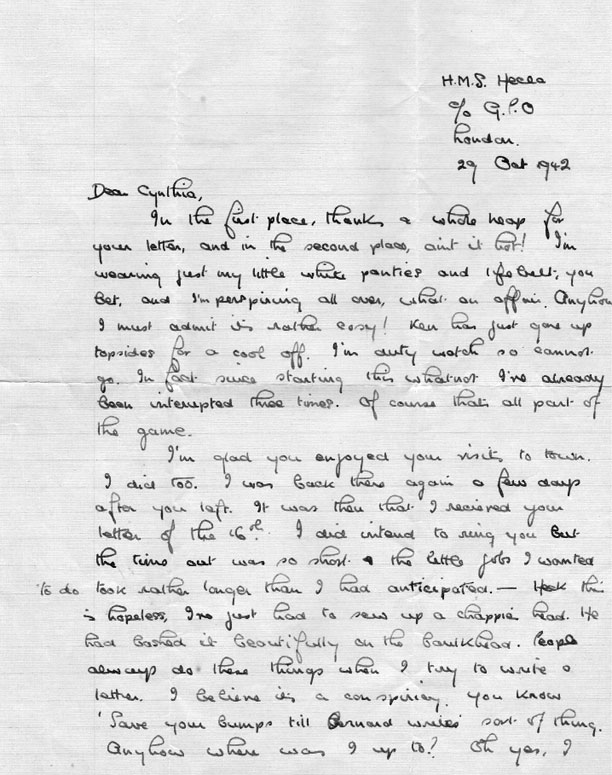



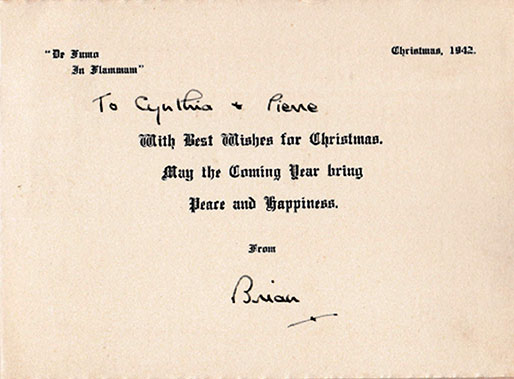

 It
wasn't difficult to return the letters sent by Kenneth Collings (left)
as I had been contacted by his son in New Zealand in November 2012 and
his father already had a page on this website. Bruce was delighted to
receive letters written by his father to Cynthia le Roux in 1942 but it
was more difficult to trace the family of Bruce Shaw (right) despite
having his address on the top of his Mother's letters.
It
wasn't difficult to return the letters sent by Kenneth Collings (left)
as I had been contacted by his son in New Zealand in November 2012 and
his father already had a page on this website. Bruce was delighted to
receive letters written by his father to Cynthia le Roux in 1942 but it
was more difficult to trace the family of Bruce Shaw (right) despite
having his address on the top of his Mother's letters. 